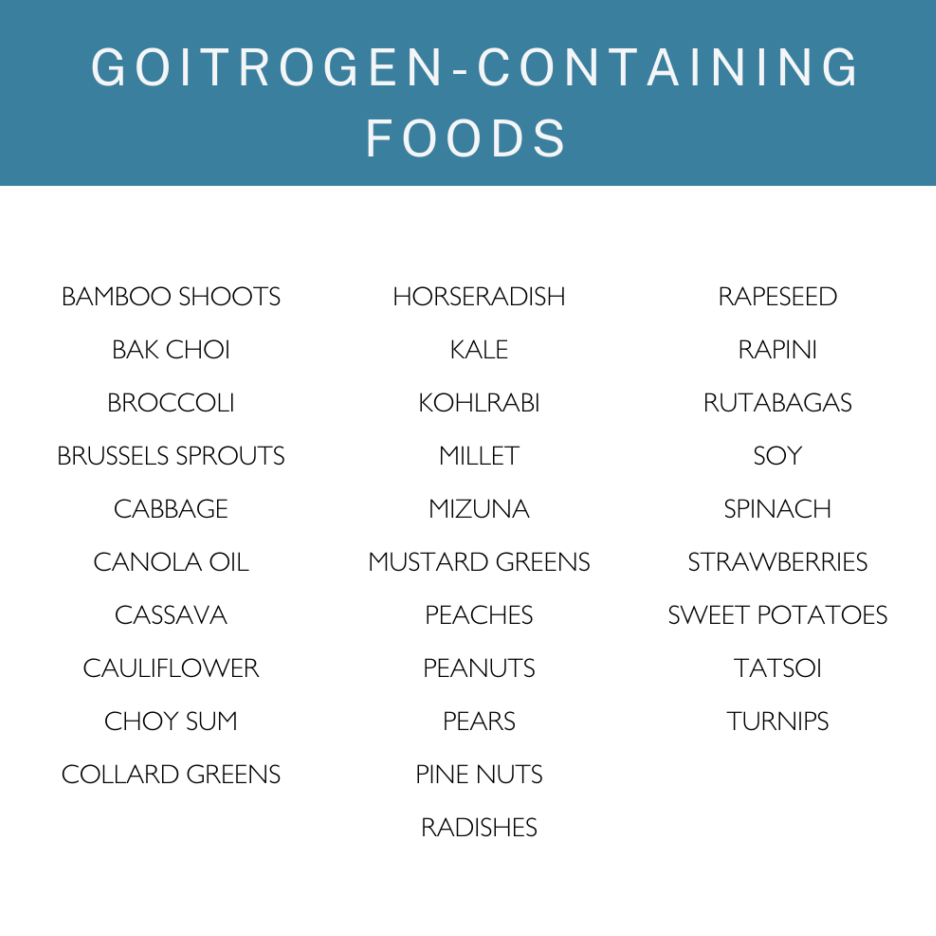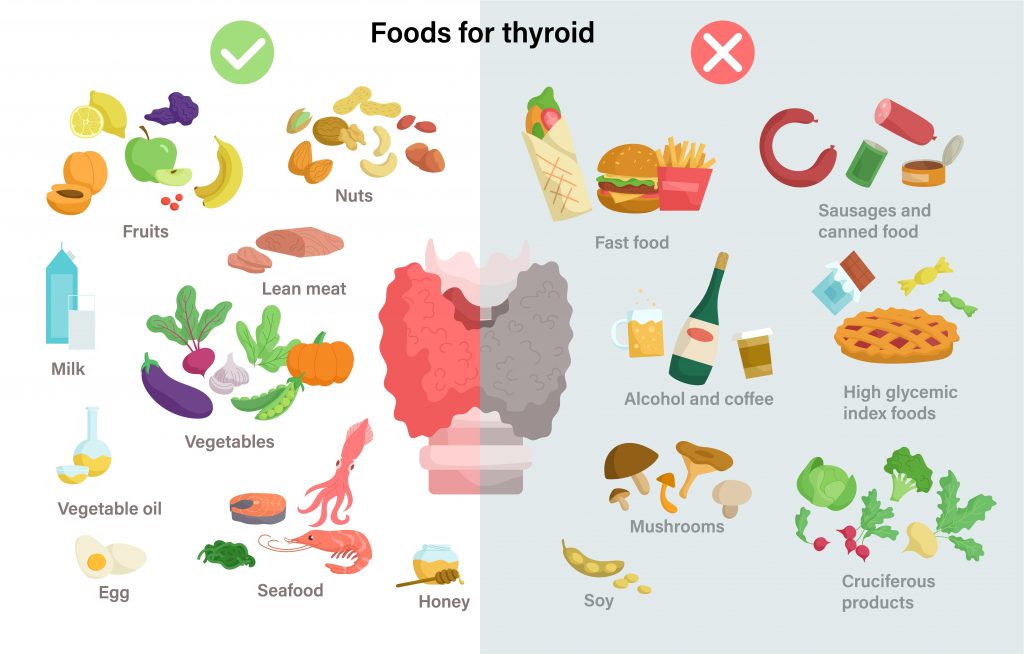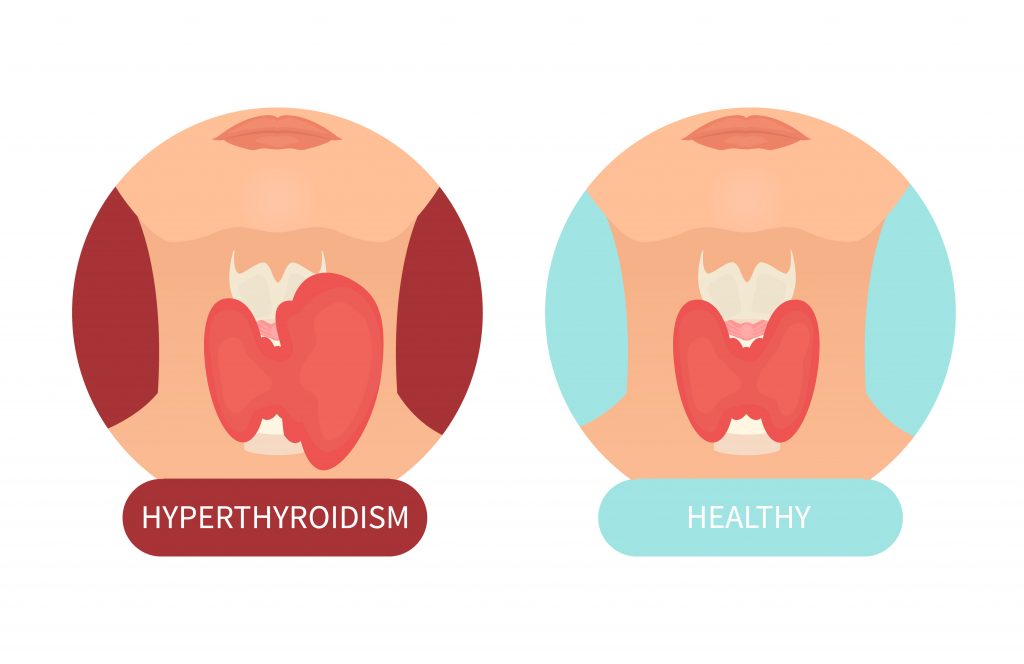Good nutrition is crucial for maintaining our health and well-being, but did you know that your diet could even affect the functioning of your thyroid? If you’re experiencing issues with your thyroid, it could be due to an imbalance in your diet. Many people don’t know that certain foods and drinks can significantly impact your thyroid’s functioning. This article will review some surprising ways your diet could affect your thyroid health.
The Thyroid & Diet
The thyroid is an essential organ for maintaining overall health, and diet plays a significant role in functioning. The thyroid is an integral part of our body’s endocrine system, and its function is essential for keeping us healthy. A balanced diet is one of the most critical steps to maintaining a healthy thyroid and other aspects of our health. Eating the right foods and avoiding certain items can make all the difference in how well your thyroid functions and, therefore, how you feel.
Impact of Diet on Thyroid
Having a healthy diet is the key to overall health and well-being. However, it is crucial to maintain a proper diet when dealing with thyroid issues. The thyroid gland helps regulate hormones in the body, and if there is an imbalance, it will lead to symptoms like fatigue, weight gain or loss, hair loss and more. Knowing what foods to eat (and avoid) can help manage and improve these symptoms.
When looking at the best diet for managing thyroid issues, iodine intake is one of the most important things to consider. Iodine helps regulate hormone production from the thyroid gland, so ensuring you get enough through your diet can be beneficial. Sea foods are some of the best sources of iodine, but plant-based options like seaweed, potatoes and cranberries also contain reasonable amounts. Eating foods containing vitamins and minerals helps support proper hormone production in the thyroid gland. Consuming fruits, vegetables, whole grains, and lean proteins are all excellent sources of these vital nutrients.
The link between Diet & Hypothyroidism
It’s no secret that what you eat affects your overall health. But did you know that diet can play a role in Hypothyroidism? Hypothyroidism; a body condition where the thyroid gland doesn’t produce enough of certain hormones, leading to fatigue, weight gain and depression. You may be surprised to know that your diet can impact this condition.
First, we must understand that several things in our diet can affect thyroid hormone production. Some foods such as soy, nuts and cruciferous vegetables contain substances called Goitrogens which make it harder for the body to absorb iodine – a nutrient necessary for proper thyroid functioning. Other dietary factors, such as low iodine intake or excessive amounts of iron, can contribute to developing or worsening Hypothyroidism. While research is still ongoing on this topic, it’s clear that diet plays a vital role in managing this condition.
Goitrogens: Foods to Avoid For Healthy Thyroid
Goitrogens can interfere with the proper functioning of the thyroid gland. These substances can be found in many common foods, and for those looking to maintain a healthy thyroid, it is essential to know which foods should be avoided.

Foods containing Goitrogens include cruciferous vegetables such as broccoli, kale, cauliflower and cabbage, soybeans, and some fruits like strawberries and peaches. Eating these foods raw or lightly cooked will maximize their Goitrogens content while cooking them helps reduce the amount of Goitrogens present. Those looking to minimize their exposure to Goitrogens should choose cooking methods such as boiling rather than stir-frying or sautéing.
Processed Foods and Thyroid Health
Processed foods have become a staple of the modern diet, but their impact on thyroid health is often overlooked. These processed and refined foods are high in sugar, trans fat, and chemical additives, which can disrupt thyroid function. For those already dealing with a thyroid disorder or autoimmune disease like Hashimoto’s, consuming these kinds of food can cause even more physical problems.
Processed foods often contain large amounts of unhealthy fats, sodium, and refined carbohydrates that can interfere with hormones and impede normal thyroid functions. These substances can lead to inflammation within the body, which can further impair hormone production from the thyroid gland. This inflammation can affect the hormones secreted by your thyroid gland, leading to an imbalance in your hormone levels.
Gluten and Its Effect on the Thyroid
In those who are sensitive to gluten, consuming it can cause an immune reaction that attacks the thyroid gland leading to inflammation and disruption of its normal function. This condition is known as Hashimoto’s Thyroiditis or autoimmune thyroid disease (AITD).

The first connection between gluten and the thyroid was established in 2008 when a study conducted at Columbia University showed that those who consumed gluten had higher levels of antibodies related to Hashimoto’s disease and celiac disease than those who did not consume food containing gluten. This means that consuming foods with gluten can make existing autoimmune conditions worse by over-activating your immune system.
Signs of a Bad Thyroid
Do you always feel fatigued, even when you get enough sleep? Are you gaining weight without changing your diet or exercise habits? These may be signs of an unhealthy thyroid. The thyroid is a gland in the throat, and its primary function is to produce hormones that regulate metabolism, heart rate, and many other body functions.
Several symptoms could indicate a problem with the thyroid. Many people experience extreme fatigue or insomnia despite adequate rest and increased sensitivity to cold temperatures. Unexplained weight gain can also occur due to an underactive thyroid, whereas an overactive thyroid can lead to sudden weight loss. Other common symptoms include dry skin, depression, constipation, irregular menstrual cycles in women and changes in nail health, such as brittle nails or ridges running across them.
Supplements to Support Healthy Thyroid Functioning
Maintaining healthy thyroid functioning is essential for overall health and well-being. It’s an integral part of a balanced diet and lifestyle, but sometimes even the best efforts aren’t enough to promote optimal thyroid health. Fortunately, supplements can provide additional support for those looking to give their thyroids a much-needed boost. Here are some of the best supplements to support your thyroid health:
Natural Herbs
Herbal supplements such as licorice root or holy basil contain active compounds that can help reduce thyroid gland inflammation. Natural herbs like ashwagandha and guggul have been used for centuries to treat thyroid imbalances ranging from hyperthyroidism (overactive) to Hypothyroidism (underactive).
Selenium
Foods high in selenium include Brazil nuts, mushrooms, tuna, eggs and sunflower seeds. Selenium works together with iodine to help make sure your thyroid functions optimally. Research has found that selenium may benefit those with hypothyroidism or Hashimoto’s, two common thyroid disorders. A daily supplement of 200 mcg can help support healthy levels of thyroid hormones and reduce inflammation in the body associated with these conditions. Also, selenium can boost immunity and protect against oxidative damage caused by environmental toxins, which could affect your thyroid health.
Iodine
Iodine is one supplement that has been linked to supporting thyroid function. It helps produce hormones and helps with the proper functioning of the thyroid. Iodine is a trace mineral found naturally in certain foods such as dairy products and seafood, with the highest concentration located in seaweeds such as kelp. Studies have shown that iodine helps produce hormones critical to normal thyroid function. Additionally, research has suggested that supplementing your diet with iodine may help reduce inflammation associated with autoimmune diseases like Hashimotos Thyroiditis.
Zinc and Copper
To ensure that your thyroid works optimally, it’s important to consider supplementing with minerals such as zinc and copper. Zinc works by helping the body form hormones that interact with the thyroid gland and support its health. Copper helps balance the body’s zinc-copper ratio; when one of these minerals is deficient, it can directly affect how well the thyroid functions. For example, too much copper in relation to zinc can result in an overactive thyroid. By supplementing both minerals, you’re providing your body with the necessary nutrients for proper thyroid functioning.
Vitamin D
Vitamin D is an important supplement to consider regarding thyroid health. Vitamin D can help the body absorb calcium and phosphorus more efficiently, which is essential for maintaining healthy thyroid functioning. With this in mind, ensuring you get enough of this crucial nutrient in your diet or supplementation is necessary.
The body needs vitamin D for various functions; beyond supporting thyroid functioning, it also helps maintain bones and teeth health and regulate the immune system. Since different types of vitamin D are available as supplements (including D2 and D3), it is best to speak with a healthcare provider about determining which form is suitable for you.
Lifestyle Changes to Improve Thyroid Health
An imbalance in thyroid hormones can cause various problems, such as depression, anxiety, and weight gain. Luckily, many lifestyle changes can help improve your thyroid health. Here are some of the tips to keep in mind:

First and foremost, it’s important to get enough sleep every night. Sleep helps regulate hormone production and is vital for the optimal functioning of your entire body. Insufficient rest has been linked to poorer thyroid functioning, so aim for seven to eight hours of sleep each night. Additionally, adding more physical activity to your daily routine is recommended. Exercise helps support hormonal balance by improving circulation and reducing stress levels. Finally, consider adding more nutrient-rich foods to your diets, like fruits and vegetables, and omega-3 fatty acids from sources like salmon or walnuts. These healthy fats will help ensure optimal thyroid health over time.
Conclusion: Eating For Optimal Thyroid Health
In conclusion, the food we eat can directly affect our thyroid health. Eating a diet with plenty of vegetables, proteins, and healthy fats, as well as avoiding foods with high sugar and Trans fat content, will help ensure that your thyroid is functioning optimally. It is also essential to be mindful of any potential food allergies or sensitivities that could trigger symptoms related to thyroid dysfunction.




